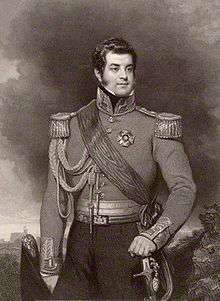George FitzClarence, 1st Earl of Munster

George Augustus Frederick FitzClarence, 1st Earl of Munster PC (29 January 1794 – 20 March 1842), was an English peer and soldier.
Life
The eldest illegitimate son of William IV of the United Kingdom and his long-time mistress Dorothea Jordan, he was well-educated, although his written English was atrocious (as was that of several of his royal uncles). Like his siblings, he had little contact with his mother after his parents separated in 1811, preferring to rely on his expectations from his father.[1] He served as an army officer during the Peninsular War and subsequently in India. His father, though proud of his military record, was deeply concerned about his drinking and gambling, vices to which many of William's brothers were prone.
He was created 1st Earl of Munster, 1st Viscount FitzClarence and 1st Baron Tewkesbury on 4 June 1831,[2][3] and made a Privy Councillor in 1833. "Earl of Munster" had been a title held by his father before his accession to the British throne. George, like his siblings, was dissatisfied with the provisions made for him and this, combined with his increasing mental instability, caused a series of quarrels with his father which ended in a complete breach.[4] The estrangement caused the King great distress, but those close to him thought it better that there be as little contact as possible, since Munster's visits invariably upset his father. Even the death of Munster's sister Sophia de L'Isle, the King's favourite child, in April 1837, did not bring about a reconciliation.
He gained the rank of Major-General in the British Army and held the office of aide-de-Camp to King William IV between 1830 and 1837. He held the office of Lieutenant of the Tower of London between 1831 and 1833, was Constable and Governor of Windsor Castle between 1833 and 1842 and aide-de-Camp to Queen Victoria between 1837 and 1841. He was elected president of the Royal Asiatic Society in 1841.
He married Mary Wyndham (29 August 1792 – 3 December 1842),[5] daughter of George Wyndham, 3rd Earl of Egremont, and his mistress Elizabeth Fox, on 18 October 1819. They were the parents to seven children:
- Lady Adelaide Georgiana FitzClarence (28 August 1820 – 11 October 1883); died unmarried.
- Lady Augusta Margaret FitzClarence (29 July 1822 – 5 September 1846); married Baron Knut Philip Bonde in Paris in 1844, died of childbed fever in Katrineholm, Sweden, one daughter (Ingeborg Augusta Sofia Bonde, 1846–1872).
- William FitzClarence, 2nd Earl of Munster (19 May 1824 – 30 April 1901).6th
- Hon. Frederick Charles George FitzClarence (1 February 1826 – 17 December 1878); married Adelaide Augusta Wilhelmine Sidney, daughter of his aunt Sophia FitzClarence; no issue.
- Lady Mary Gertrude FitzClarence (ca. 1832 – 1834); died in infancy.[6]
- Capt. George FitzClarence (15 April 1836 – 24 March 1894); married Maria Henrietta Scott (d. 1912), had issue. He is the grandfather of the 5th earl of Munster. The title became extinct in 2000.
- Lt. Edward FitzClarence (8 July 1837 – 23 July 1855); died of wounds during the Siege of Sevastopol in the Crimean War.
FitzClarence committed suicide at the age of 48 in London.[7] He shot himself with a pistol presented to him by King George IV when Prince of Wales. His suicide came as no surprise to his family who had long been concerned about his mental condition; his father's biographer attributes it to "a paranoiac sense of persecution."[8] At his inquest, his doctor and a surgeon told the coroner that they believed he was going mad, and in recent years there has been speculation that he suffered from the probably hereditary malady of porphyria which had afflicted his grandfather and several other members of the family.[9]
Works
An account of his experiences in the Peninsular War was published in: Memoirs of the Late War: Comprising the Personal Narrative of Capt. Cooke, the History of the Campaign of 1809 in Portugal, by the Earl of Munster, and a Narrative of the Campaign of 1814 in Holland, by T.W.D. Moodie. 1831.
Ancestry
| Ancestors of George FitzClarence, 1st Earl of Munster | ||||||||||||||||||||||||||||||||||||||||||||||||||||||||||||||||||||||||||||||||||||||||||||||||||||||||||||||||||||||||||||||||||||||||||||||||||||||||||||||||||||||||||||||||||||||||||||||||||||||||||||||||||||||||||||||||||||||||||||||||||||||||||||||||||||||||||||||||||||||||||||||||||||||||||||||||||||||||||||||||||||||||||||||||||||||||||||||||||||||||||||||||||||||||||||||||||||||||||||||||||||||||||||||||||||||||||||||||||||
|---|---|---|---|---|---|---|---|---|---|---|---|---|---|---|---|---|---|---|---|---|---|---|---|---|---|---|---|---|---|---|---|---|---|---|---|---|---|---|---|---|---|---|---|---|---|---|---|---|---|---|---|---|---|---|---|---|---|---|---|---|---|---|---|---|---|---|---|---|---|---|---|---|---|---|---|---|---|---|---|---|---|---|---|---|---|---|---|---|---|---|---|---|---|---|---|---|---|---|---|---|---|---|---|---|---|---|---|---|---|---|---|---|---|---|---|---|---|---|---|---|---|---|---|---|---|---|---|---|---|---|---|---|---|---|---|---|---|---|---|---|---|---|---|---|---|---|---|---|---|---|---|---|---|---|---|---|---|---|---|---|---|---|---|---|---|---|---|---|---|---|---|---|---|---|---|---|---|---|---|---|---|---|---|---|---|---|---|---|---|---|---|---|---|---|---|---|---|---|---|---|---|---|---|---|---|---|---|---|---|---|---|---|---|---|---|---|---|---|---|---|---|---|---|---|---|---|---|---|---|---|---|---|---|---|---|---|---|---|---|---|---|---|---|---|---|---|---|---|---|---|---|---|---|---|---|---|---|---|---|---|---|---|---|---|---|---|---|---|---|---|---|---|---|---|---|---|---|---|---|---|---|---|---|---|---|---|---|---|---|---|---|---|---|---|---|---|---|---|---|---|---|---|---|---|---|---|---|---|---|---|---|---|---|---|---|---|---|---|---|---|---|---|---|---|---|---|---|---|---|---|---|---|---|---|---|---|---|---|---|---|---|---|---|---|---|---|---|---|---|---|---|---|---|---|---|---|---|---|---|---|---|---|---|---|---|---|---|---|---|---|---|---|---|---|---|---|---|---|---|---|---|---|---|---|---|---|---|---|---|---|---|---|---|---|---|---|---|---|---|---|---|---|---|---|---|---|---|---|---|---|---|---|---|---|---|---|---|---|---|---|---|---|---|---|---|---|---|---|---|---|---|---|---|---|---|---|
| ||||||||||||||||||||||||||||||||||||||||||||||||||||||||||||||||||||||||||||||||||||||||||||||||||||||||||||||||||||||||||||||||||||||||||||||||||||||||||||||||||||||||||||||||||||||||||||||||||||||||||||||||||||||||||||||||||||||||||||||||||||||||||||||||||||||||||||||||||||||||||||||||||||||||||||||||||||||||||||||||||||||||||||||||||||||||||||||||||||||||||||||||||||||||||||||||||||||||||||||||||||||||||||||||||||||||||||||||||||
References
- ↑ Ziegler, Philip, William IV, William Collins, 1971, p. 108.
- ↑ The London Gazette: no. 18803. p. 923. 13 May 1831.
- ↑ Yvonne's Royalty: Peerage
- ↑ Ziegler, p. 158.
- ↑ Haines, Sheila; Lawson, Leigh (2007). Poor Cottages & Proud Palaces. The Hastings Press, p. 45.
- ↑ Mary Gertrude Fitz-Clarence in: thePeerage.com [retrieved 5 December 2014].
- ↑ Weir, Alison (1996),Britain's Royal Families, Random House:London. p304.
- ↑ Ziegler, p. 270.
- ↑ Van der Kiste, John, George Fitzclarence, Earl of Munster, Amazon KDP, 2012.
External links
| Wikisource has original text related to this article: |
| Honorary titles | ||
|---|---|---|
| Preceded by William Loftus |
Lieutenant of the Tower of London 1831–1833 |
Succeeded by Lord Frederick FitzClarence |
| Preceded by The Marquess Conyngham |
Constable of Windsor Castle 1833–1842 |
Succeeded by Prince Augustus Frederick |
| Peerage of the United Kingdom | ||
| New creation | Earl of Munster 1831–1842 |
Succeeded by William FitzClarence |